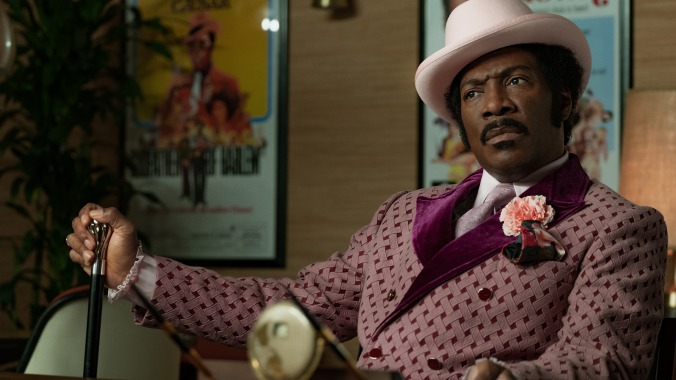Eddie Murphy goes back to the '70s for the blaxploitation biopic Dolemite Is My Name


For a movie where someone says “motherfucker” every few seconds, Dolemite Is My Name is surprisingly wholesome. The film is a biopic about stand-up comedian and blaxploitation leading man Rudy Ray Moore, an Arkansas native who, after several failed attempts at becoming famous, finally succeeded by combining the rhythms of traditional African American storytelling with the sexually liberated energy of the early ’70s on raunchy X-rated “party records” with titles like Eat Out More Often. And as such, any film about Moore’s life that didn’t include wall-to-wall dirty jokes would be a disservice to his foul-mouthed legacy. At the same time, however, Dolemite Is My Name posits Moore’s story as a feel-good inspirational tale about outsiders succeeding despite all odds. And while Moore’s sexuality was more complex than this movie lets on, characterizing him as an underdog who forces Hollywood to notice him through sheer talent and force of will is right on.
Eddie Murphy, angling to cast his leopard-print fedora back into the awards ring after a decade of critical ignominy, stars in the title role. This casting is a stroke of genius on two counts: First, the beginning of Dolemite Is My Name follows Moore as he develops his signature character—an outsize, swaggering pimp named Dolemite—and it’s a pleasure to watch Murphy draw from his own experience as a stand-up for the film’s backstage procedural scenes. Second, Moore blossomed from a likable guy into a supernaturally charismatic one when he stepped into character, and we see this same change in Murphy when he puts on the Dolemite hairpiece early on in the film. In terms of drama, Murphy isn’t challenged all that much here; the most he has to pull out range-wise is to be discouraged in some scenes, and tenacious in others. He also never fully loses himself in the role, although that may simply be a side effect of Murphy’s own fame. But when he’s all dressed up in that polyester leisure suit and frilly shirt, turning toward the camera with his face stretched into the wide grin that made him famous, the thrill of remembering what a great comedic performer Eddie Murphy can be is electric.
After an accelerated recounting of Dolemite’s rise from a stock character in the colorful tales told by the homeless men in Moore’s neighborhood to a nationwide phenomenon (among Black audiences, at least), the majority of Dolemite Is My Name focuses on the self-funded production of Moore’s cinematic magnum opus. Brewer’s storytelling style is breezy and freewheeling throughout, keeping the story moving from vignette to vignette as if he’s moving the needle on a record. Toward the end of the film, however, the director inserts just one brassy montage set to a ’70s funk hit too many, and you begin to wish that screenwriters Scott Alexander and Larry Karaszewski had approached Moore’s life with the same focus as in their Oscar-winning script for Ed Wood (1994).
But what the film lacks in depth, it makes up for in personality. Murphy’s obviously the star here, but Moore’s loyal entourage comes to the movie with plenty of charisma of its own. The film is full of big personalities, some drawn from real life—activist playwright and Dolemite screenwriter Jerry Jones (Keegan-Michael Key), for example, or egotistical blaxploitation star D’Urville Martin (Wesley Snipes)—and others invented for the film. (Casting Snoop Dogg in a small role as a radio DJ is a nice touch, given Snoop’s quote that, “without Rudy Ray Moore, there would be no Snoop Dogg, and that’s for real.”) Tituss Burgess, Craig Robinson, and Mike Epps are also a constant, consistently funny presence in the film as Moore’s cocksure trio of smack-talking best friends.
But the standout supporting player is Da’Vine Joy Randolph as Lady Reed, a heartbroken woman Moore meets on tour who becomes his co-star, confidant, and platonic companion. The chemistry between Randolph and Murphy is easy and affectionate—although, like all the relationships in the film, its nature isn’t interrogated with much intensity. But it’s genuinely moving when she tells him, “I’m so grateful for what you did for me, cause I’d never seen nobody that looks like me up there on that big screen,” toward the end of the film. Although this is in no way an “issues movie”—Moore’s weight is brought up as often as his race as a barrier to his stardom—themes of racism in Hollywood and the importance of representation are key to the movie’s heart.
And the systemic issues that forced Moore to spend his life savings in order to fund Dolemite when no one else would are far from solved. Nearly 45 years later, prestige period films with majority Black casts are still rare, and Netflix clearly opened its pockets wide to make sure this one gives a convincing, if slightly exaggerated, impression of ‘70s L.A. The costumes are a special highlight, all loud prints on polyester and flamboyant evening wear; these come from Ruth E. Carter, who became the first Black person to win an Oscar for costume design earlier this year. This high-volume period setting combines with the splashy editing and hilarious dialogue to create an overall tone that reflects the essence of who Rudy Ray Moore was as a person. (Or, at least, this film’s version of it.) Like Rudy Ray Moore himself, Dolemite Is My Name is sometimes brash, always good-natured, proudly imperfect, and endlessly entertaining.